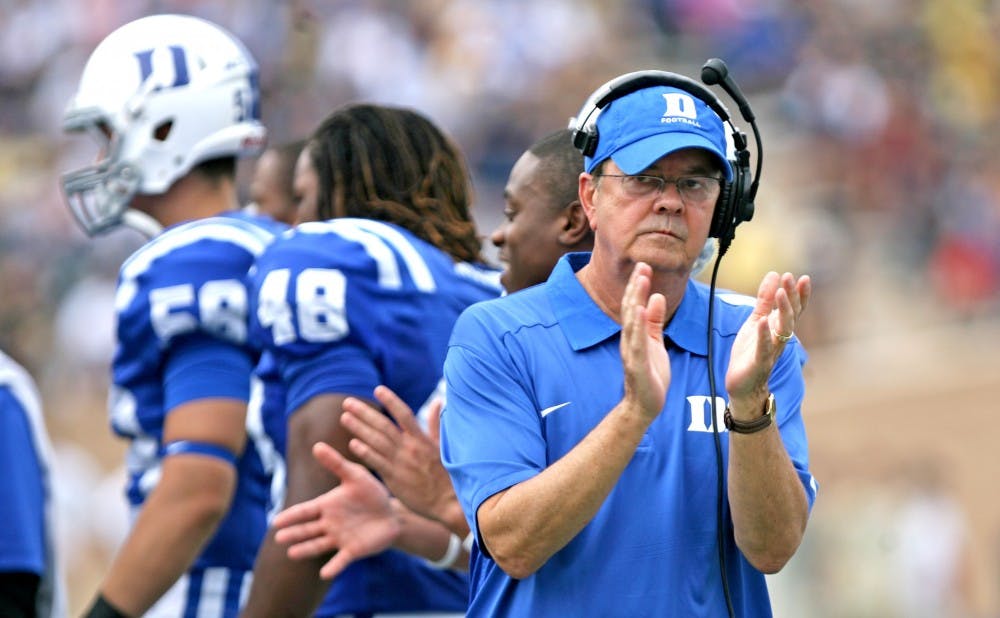Week four around the NCAA was the first time since the 30-minute suspension of Texas A&M quarterback Johnny Manziel that issues surrounding pay-for-play took center stage.
This time, the discussion hit a lot closer to home for Duke.
Shockwaves were sent through the college football community Friday when an interview clip featuring Houston Texans running back Arian Foster from the documentary "Schooled: The Price of College Sports" was obtained by Sports Illustrated. In the segment, Foster admitted that he had accepted side payments during his collegiate career at Tennessee.
Although the recent issues surrounding pay-for-play have concerned the NCAA's use of players' likenesses for merchandizing and sales purposes, Foster said his concerns were with paying for food and rent.
"I go to my dorm room, open my fridge and there's nothing in my fridge," Foster said in the interview. "Hold up, man. What just happened? Why don't I have anything to show for what I just did? There was a point where we had no food, no money, so I called my coach, and I said, 'Coach, we don't have no food. We don't have no money. We're hungry. Either you give us some food, or I'm gonna go do something stupid.' He came down and he brought like 50 tacos for like four or five of us, which is an NCAA violation. But then, the next day I walk up to the facility, and I see my coach pull up in a brand new Lexus. Beautiful."
Duke head coach David Cutcliffe served as Foster's offensive coordinator at Tennessee during the running back's sophomore and junior seasons. At his weekly press conference Tuesday, Cutcliffe was quick to dismiss Foster's claims, calling the Texans' running back's interview one of the worst he'd ever seen.
"Arian never looked hungry his entire career," Cutcliffe said. "[His scholarship] pays food and rent, and on gameday when you go back to your dorm, you usually have $15 of meal money on you, which will buy 10 tacos."
One of Cutcliffe's team captains, redshirt senior cornerback Ross Cockrell, echoed his head coach's sentiment when he said that his Duke scholarship helps him keep food on the table and a roof over his head.
"Here we have everything that's covered. I don't know what goes on at other programs," Cockrell said. "I feel like at Duke we have a great situation. I'm happy about how we're treated here."
With Foster's words echoing throughout college football stadiums throughout the country, several groups of players took to the field with protests Saturday. Among these groups were several players from Georgia Tech, including quarterback and Durham native Vad Lee and defensive end Jeremiah Attaochu. They wore armbands with the hashtag #APU, an acronym for "All Players United," to support the National Collegiate Players Association, an advocacy group that supports NCAA reform.
The Yellow Jackets had taken the field Wallace Wade Stadium and defeated the Blue Devils 38-14 just one week before the protest.
Although Cutcliffe said he was unaware of the protests, which included players from Georgia and Northwestern as well, it appears the winds of change are sweeping back through the ACC.
Before the start of the college football season, Clemson cornerback Darius Robinson was one of six current NCAA football players to join the class action lawsuit started by former UCLA basketball player Ed O'Bannon, who is suing the NCAA, EA Sports and the Collegiate Licensing Company for profiting from players' likenesses in college sports video games.
"As long as there's the amount of media we have and the opportunity, you're going to see these protests," Cutcliffe said. "I don't see anybody getting abused."
Even with the foreseeable end to conference realignment, college football is a sport that will continue to undergo significant changes in the coming year. On the field, these changes are widely viewed to be positive ones, most notably the end of the BCS era and the inception of a long-awaited playoff system.
But off-field issues continue to hamper the sport. Even as Penn State presses on in the post-Jerry Sandusky era and Miami attempts to move past the Nevin Shapiro investigation, a budding scandal at Oklahoma State that encompasses everything from illegal payments to sex and drugs is keeping the dangers of mixing big money and college sports in the national spotlight.
Because NCAA scholarships are only allowed to cover tuition and fees, room and board and required course-related books, one of the proposed solutions is to amend college scholarships to reflect the full cost of attendance, which would provide athletes with a stipend of a few thousand dollars per year to help pay for expenditures not covered by their scholarships.
Such expenditures could include travel, clothing and laundry, but Cutcliffe added that the majority of these expenses could be covered by a need-based Pell Grant or the NCAA's needy student assistance fund, which spent more than $53 million on 81,000 student-athletes in 2010-11.
As the debates surrounding pay-for-play continue to rage on, Cutcliffe urged players and coaches around the country to take a step back and examine the broader perspective.
"Let's be careful what we're complaining about," Cutcliffe said. "I keep hearing it's so broken. Good gosh, look at the attendance. Look what's going on every weekend. What is so broken? Somebody said that it's just not working. When did it quit working? That's my question."
Although the idea of scholarships covering full cost of attendance is a popular one among players and pundits, Cutcliffe was quick to point out the potential negative effects such a system could have on college football.
"Let me tell you what it's going to do. All of that is going to make it so expensive to come to a college athletics event that then it will be broken," Cutcliffe said. "I'm sorry to disagree with so many intelligent people who seem to think they understand the circumstance."
Get The Chronicle straight to your inbox
Signup for our weekly newsletter. Cancel at any time.

